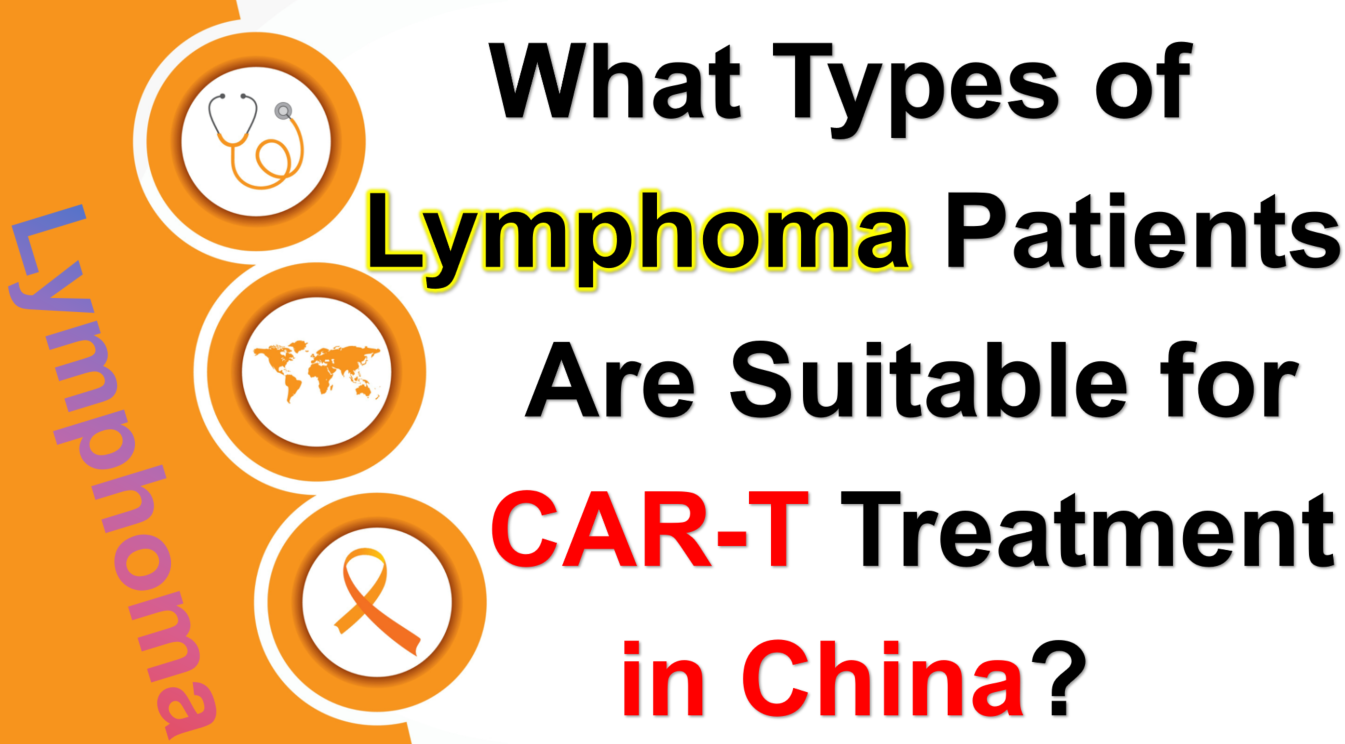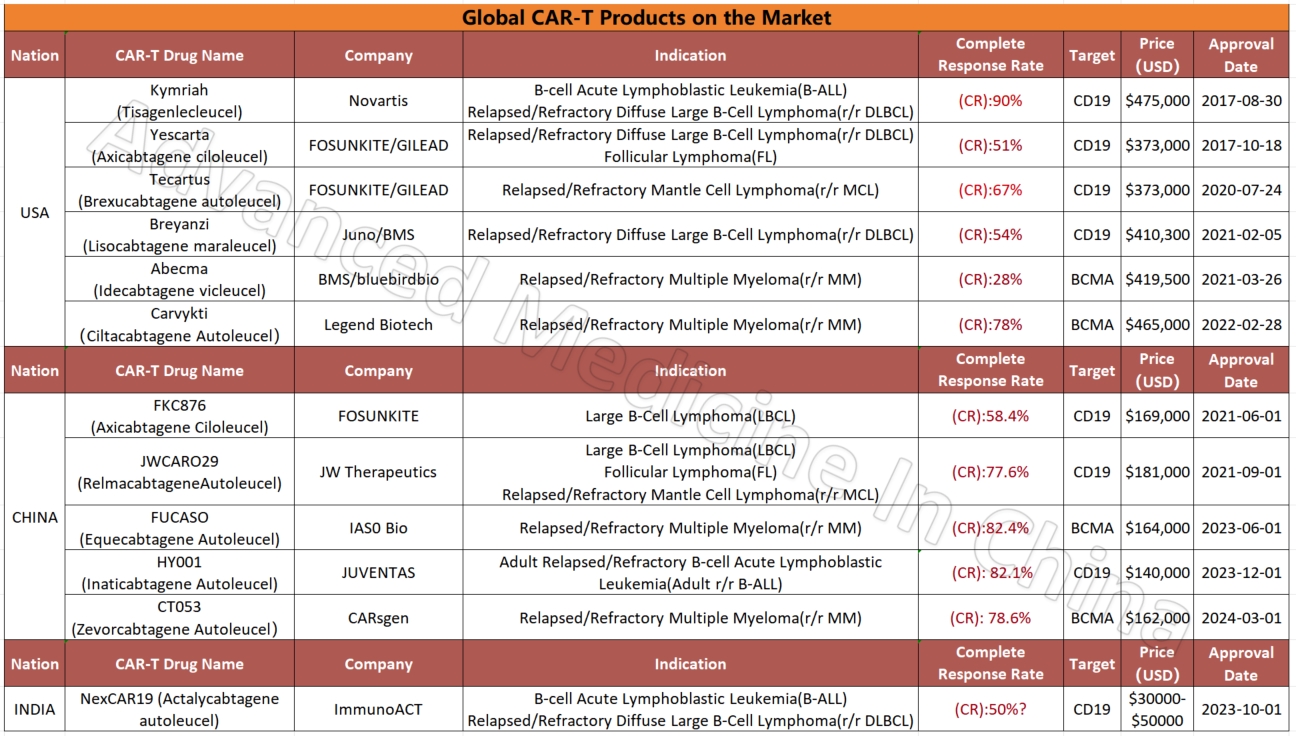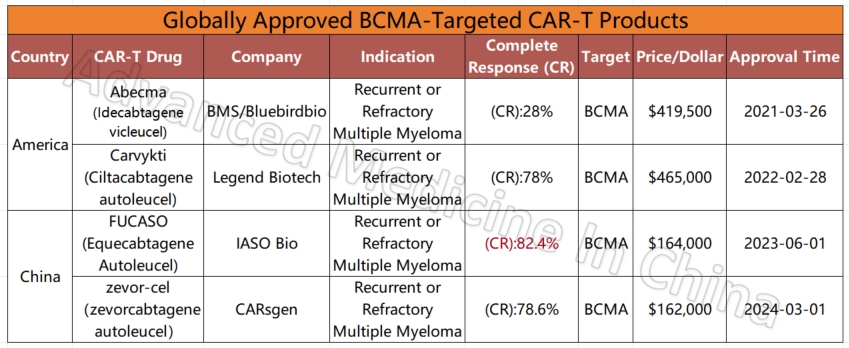Warning: Trying to access array offset on value of type bool in /www/wwwroot/www.medtourcn.com/wp-content/themes/medical-directory/framework/theme/medicaldirectory-image.php on line 78
Warning: Trying to access array offset on value of type bool in /www/wwwroot/www.medtourcn.com/wp-content/themes/medical-directory/framework/theme/medicaldirectory-image.php on line 79

China’s CAR-T Cell Therapy: Leading a New Revolution in the Treatment of Relapsed/Refractory Mantle Cell Lymphoma (MCL)

MCL
#CARTCellTherapy #MantleCellLymphoma #RelapsedMCL #RefractoryMCL #Hematology #MCL
Mantle Cell Lymphoma (MCL), a rare and complex subtype of non-Hodgkin’s lymphoma, exhibits both aggressive and indolent characteristics. Since MCL patients are usually diagnosed at an advanced stage, often with poor prognostic factors, traditional treatments such as chemotherapy and immunotherapy have brought survival benefits to some patients. However, most still face disease relapse or progression, particularly those with relapsed/refractory (r/r) MCL, where treatment poses significant challenges. For a long time, treatment options for MCL have been limited, making it difficult to achieve long-term remission or cure, highlighting the need for breakthroughs.
Chinese CAR-T Cell Therapy: Offering Hope for Relapsed/Refractory MCL With the rapid development of biotherapeutics, Chinese CAR-T cell therapy has emerged as a breakthrough innovation in lymphoma treatment. Since the approval of the world’s first CAR-T product in 2017, China has made significant progress in CAR-T research and application, especially in treating r/r MCL, where CAR-T therapy has shown excellent efficacy. CAR-T therapy not only significantly improves patient remission rates but also offers new survival opportunities for high-risk patients with poor prognoses.
Efficacy: In recent years, multiple international and Chinese clinical studies have confirmed the efficacy of CAR-T cell therapy in patients with relapsed/refractory MCL. Clinical data from China have also demonstrated outstanding results. In August 2024, the Chinese CAR-T product Relmacabtagene Autoleucel, a CD19-targeted CAR-T cell therapy, was approved for its third indication, treating adult patients with relapsed/refractory MCL (r/r MCL). Clinical data showed that Relmacabtagene Autoleucel achieved an overall response rate of 81.4%, with a complete response rate of 67.8%. The median progression-free survival (PFS) was 13 months, and the median overall survival (OS) was 19.5 months. These data further prove that Chinese CAR-T cell therapy not only has high efficacy in r/r MCL patients but also provides lasting survival benefits.
Side Effect Management: Despite its remarkable efficacy, CAR-T therapy is associated with certain side effects, such as cytokine release syndrome (CRS) and neurotoxicity (NT). However, with the continuous optimization of treatment technologies and accumulated experience in China, the incidence of side effects has been effectively controlled. In treating relapsed/refractory MCL patients, Chinese medical teams have been able to limit the occurrence of grade ≥3 CRS and NT to 6.8% in clinical practice. This lower toxicity makes CAR-T therapy safer in clinical applications, offering a new option for patients who cannot tolerate traditional treatments. Particularly for those who are resistant to Bruton’s tyrosine kinase inhibitors (BTKi) or ineligible for autologous hematopoietic stem cell transplantation, Chinese CAR-T therapy provides a gentler and effective treatment option.
Indications: The following groups of patients can benefit from Chinese CAR-T cell therapy:
-
Patients with relapsed/refractory MCL (r/r MCL)
-
MCL patients who do not respond to conventional treatments
-
Patients with poor prognostic factors (TP53 mutation, Ki67≥30%, blastoid MCL, pleomorphic MCL, POD24)
-
Patients previously exposed to BTKi or resistant/relapsed/refractory MCL
-
High-risk patients unsuitable for transplantation who cannot achieve good remission
Conclusion: With the widespread application of Chinese CAR-T therapy globally, more MCL patients, both domestic and international, are able to achieve deep remission and long-term survival. This not only marks a significant advancement in China’s hematological cancer treatment but also signifies that Chinese CAR-T cell therapy is leading a new transformation in the treatment of relapsed/refractory lymphoma worldwide.
🎉🎉To assess whether the condition is suitable for CAR-T therapy, you can submit pathology reports, treatment history, and discharge summaries to the Medical Department of <Advanced Medicine in China> for preliminary evaluation!
WhatsApp: Https://wa.me/+8613717959070
Email: doctor.huang@globecancer.com
#CancerTreatment #Immunotherapy #CancerResearch #Chinesemedicalbreakthrough #LymphomaTreatment #Oncology #Biotherapy #CancerInnovation
Warning: Trying to access array offset on value of type bool in /www/wwwroot/www.medtourcn.com/wp-content/themes/medical-directory/framework/theme/medicaldirectory-image.php on line 78
Warning: Trying to access array offset on value of type bool in /www/wwwroot/www.medtourcn.com/wp-content/themes/medical-directory/framework/theme/medicaldirectory-image.php on line 79

What Types of Lymphoma Patients Are Suitable for CAR-T Treatment in China?
# What Types of Lymphoma Patients Are Suitable for CAR-T Treatment in China?

Lymphoma
#CART #Lymphoma #DLBCL #LBCL #MedicalTourism #FL #MCL
In recent years, CAR-T cell therapy has sparked a revolution in cancer treatment worldwide, achieving remarkable results, especially in lymphoma care. As one of the global leaders in CAR-T therapy, China has attracted a large number of international patients seeking this cutting-edge immunotherapy. So, what types of lymphoma patients are suitable to travel to China for this advanced treatment?
## Indications: The First Choice for Relapsed or Refractory Lymphoma Patients
CAR-T treatment in China primarily targets patients with relapsed or refractory diffuse large B-cell lymphoma (DLBCL), follicular lymphoma (FL), and mantle cell lymphoma (MCL). Specific patient groups that are suitable include:
1. **Relapsed DLBCL**: Patients who did not respond to first-line treatments, such as R-CHOP, or relapsed within 12 months after treatment.
2. **Follicular Lymphoma (FL)**: Patients with grade 1-3a FL who have relapsed or are refractory after at least two lines of treatment.
3. **Mantle Cell Lymphoma (MCL)**: Patients whose disease remains difficult to control even after multiple treatments, including BTK inhibitors.
4. Patients whose lymphoma is resistant to traditional treatments or who experience rapid relapse after therapies such as conventional chemotherapy and targeted treatments.
5. More indications include diffuse large B-cell lymphoma (not otherwise specified), DLBCL transformed from follicular lymphoma, primary mediastinal large B-cell lymphoma, and high-grade B-cell lymphoma with MYC and BCL2 and/or BCL6 rearrangement, as well as grade 3b follicular lymphoma.
CAR-T therapy offers new hope to these patients by targeting the CD19 antigen on the surface of tumor cells.
## Physical Condition: Stable Health is Key
While CAR-T therapy has shown significant efficacy, the potential for serious side effects, such as **cytokine release syndrome (CRS)** and **neurotoxicity**, means that patients must be in stable health to tolerate the risks associated with treatment. Suitable patients should meet the following conditions:
– **Good heart and lung function**: The patient’s cardiovascular and respiratory health should be adequate to handle the stress of treatment.
– **Normal liver and kidney function**: Liver enzymes (such as ALT) and creatinine levels should be within normal ranges to ensure that the patient can properly eliminate toxins from the body.
– **Stable immune system**: Patients should not have severe infections or immunosuppressed conditions, as CAR-T therapy can further weaken the immune system, increasing the risk of infection.
Additionally, patients need to achieve a performance status score of 0-1 on the ECOG scale, indicating that they have good functional ability and can handle daily activities independently.
## Pre-Treatment Testing: Ensuring Proper Antigen Expression
CAR-T therapy targets specific antigens (such as CD19) on the surface of tumor cells, so patients’ cancer cells must express these antigens for treatment to be effective. If tests show that the tumor cells do not express the relevant antigens, CAR-T therapy will not work effectively.
## Costs and Resources: The Advantages of CAR-T in China
Compared to Western countries, CAR-T therapy in China is relatively affordable, usually costing between hundreds of thousands to one million RMB, whereas in the U.S., CAR-T treatment can cost several hundred thousand dollars. For patients with the financial ability but who find it difficult to bear the high costs of treatment in the West, China offers a significant cost advantage.
Moreover, China boasts several top-tier hospitals with established CAR-T treatment programs, such as leading cancer centers in Beijing, Shanghai, and Guangzhou. These hospitals have extensive clinical experience, offering international patients convenient access to treatment.
## Contact Us:
The Advanced Medicine in China team has a wealth of connections with doctors and hospitals, enabling us to quickly help you find the most suitable hospital and expert team for your specific needs. In China, we provide a fast-track option for CAR-T treatment.
## Conclusion
With its cost advantages, advanced medical resources, and broad indications, CAR-T therapy in China has attracted a large number of international lymphoma patients. For those who have failed traditional treatments, are in good physical condition, and have sufficient financial means, CAR-T treatment in China is an ideal choice. If you or someone close to you meets these conditions, consider coming to China for world-leading CAR-T therapy, and open the door to new hope in the fight against cancer.

 To assess whether the condition is suitable for CAR-T therapy, you can submit pathology reports, treatment history, and discharge summaries to the Medical Department of <Advanced Medicine in China> for preliminary evaluation!
To assess whether the condition is suitable for CAR-T therapy, you can submit pathology reports, treatment history, and discharge summaries to the Medical Department of <Advanced Medicine in China> for preliminary evaluation!
WhatsApp: Https://wa.me/+8613717959070
Email: doctor.huang@globecancer.com
#CancerTherapy #CARTinChina #RelapsedLymphoma #RefractoryLymphoma #FollicularLymphoma #MantleCellLymphoma #Immunotherapy #CancerRevolution #AdvancedCancerCare #CD19Targeting #CancerHope #CancerCare #ChineseHospitals #GlobalHealth #CancerSurvivors #CARTSuccess #MedicalInnovation
Warning: Trying to access array offset on value of type bool in /www/wwwroot/www.medtourcn.com/wp-content/themes/medical-directory/framework/theme/medicaldirectory-image.php on line 78
Warning: Trying to access array offset on value of type bool in /www/wwwroot/www.medtourcn.com/wp-content/themes/medical-directory/framework/theme/medicaldirectory-image.php on line 79

Global CAR-T Products on the Market and BCMA-Targeted CAR-T Products
Global CAR-T Products on the Market

CAR-T
Globally Approved BCMA-Targeted CAR-T Products
– Multiple Myeloma

Multiple Myeloma

 To assess whether the condition is suitable for CAR-T therapy, you can submit pathology reports, treatment history, and discharge summaries to the Medical Department of Advanced Medicine in China for preliminary evaluation!
To assess whether the condition is suitable for CAR-T therapy, you can submit pathology reports, treatment history, and discharge summaries to the Medical Department of Advanced Medicine in China for preliminary evaluation!
WhatsApp: Https://wa.me/+8613717959070
Email: doctor.huang@globecancer.com
Warning: Trying to access array offset on value of type bool in /www/wwwroot/www.medtourcn.com/wp-content/themes/medical-directory/framework/theme/medicaldirectory-image.php on line 78
Warning: Trying to access array offset on value of type bool in /www/wwwroot/www.medtourcn.com/wp-content/themes/medical-directory/framework/theme/medicaldirectory-image.php on line 79

CAR-T Therapy in China: Relma-cel Offers Deep and Lasting Remission for Patients with Relapsed/Refractory Mantle Cell Lymphoma (MCL)
CAR-T Therapy in China: Relma-cel Offers Deep and Lasting Remission for Patients with Relapsed/Refractory Mantle Cell Lymphoma (MCL)

MCL
